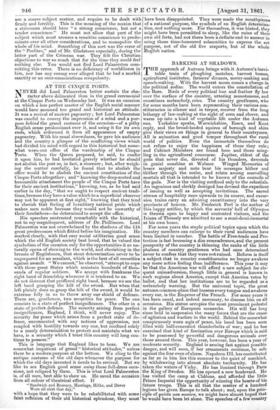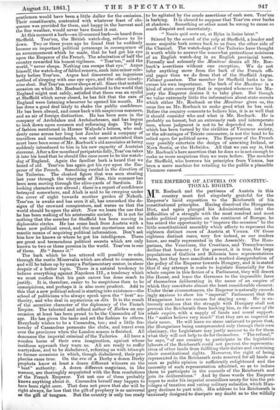BARKING AT SHADOWS.
THE approach of Autumn brings with it Autumn's inevi- table train of ploughing matches, harvest homes, agricultural institutes, farmers' dinners, merry-making and speech-making. With the harvest moon comes a change in the political zodiac. The world enters the constellation of the Bore. Birds of every political hue and feather fly low over the surface of the country, uttering monotonous, and sometimes melancholy, cries. The country gentlemen, who for some months have been representing their various con- stituencies in silence and in torpor, recover from the long lethargy of law-making at the sight of corn and clover, and warm up into a kind of vegetable life under the Autumn sun. Yorkshire speaks, Warwickshire, Essex, and Kent reply, and the broad-landed squires of borough and shire give their views on things in general to their countrymen. All is animation and good temper throughout the rural world of politics. Even the immortals themselves do not refuse to enjoy the happiness of those they rule ; and Cabinet Ministers are found here and there ming- ling in the agricultural concourse. Jupiter, eldest of the gods that never die, divested of his thunders, descends in t, genial sunshine at Walmer. Winged Mercuries of lesser majesty and note bear his messages hither and thither through the realm, and relate among marvelling mortals all that is intended to be known of the councils of the gods. Nor is the visiting confined only to the celestials. An ingenious and clerkly demigod has devised the expedient of issuing as well as accepting invitations. The sacred stream of hospitality runs upwards to its source, and excur- sion trains carry an admiring constituency into the very precincts of heaven. Mr. Frederick Peel is the author of this happy artifice, by which the servants' hall of Olympus is thrown open to happy and contented visitors, aud the Ixions of Thessaly are admitted to see a semi-demi-immortal at his own home.
For some years the staple political topics upon which the country members can enlarge to their rural audiences have been limited in number. The battle of Free-trade and Pro- tection is fast becoming a dim remembrance, and the present prosperity of the country is thinning the ranks of the little phalanx of country gentlemen who had once determined never to confess that they were not ruined. Reform is itself a subject that in country constituencies no longer awakens any more active feeling than indifference. This year it may be that the American war will afford a new subject for elo- quent animadversion, though little in general is known in such regions about America, except that America votes by ballot, and that her institutions are to be regarded as a melancholy warning. But the universal topic, the great autumn common-place that loosens every tongue and awakens every ear, is the Emperor of the French. For some years it has been usual, and indeed necessary, to discuss him on all occasions. His statue occupies the most prominent pedestal in the gallery of European monarchs. His will has long since held in suspension the many forces that are the cause of agitation and warfare in the world. Behind the somewhat conspicuously worn aegis of peace, his hand has been seen filled with half-concealed thunderbolts of war; and he has exercised that kind of fascination over Europe which is paid to be possessed by powerful and dangerous animals over those around them. This year, however, has been a year of moderate security. England is arming fast against possible danger, and will soon, if her armaments continue, be safe against the fear even of alarm. Napoleon III. has contributed as far as in him lies this summer to the quiet of mankind, ; by withdrawing into almost absolute taciturnity. He has taken the waters of Vichy. He has lionized through Paris the King of Sweden. He has opened a new boulevard. He has visited the camp at Chalons, and afforded the little Prince Imperial the opportunity of winning the hearts of his future troops. This is all that the master of a hundred legions has given Europe to talk about; and, upon the prin- ciple of quieta non movers, we might have almost hoped that he would have been let alone. The speeches of a few country gentlemen would have been a little duller for the omission. Their constituents, contented with whatever feast of elo- quence was provided for them, and happy in the harvest and the fine weather, would never have found it out. At this moment a bark—an ill-omened bark—is heard from Sheffield. Tear'em, the British watch-dog, refuses to lie down. Two or three years ago he found that he suddenly became an important political personage in consequence of an announcement which he made, that he had got his eye upon the Emperor of the French. The admiration of half the country rewarded his honest vigilance. "Tear'em," said the world, never sleeps. Nothing can escape that eye." Argus himself, the watch-dog of fabled renown, sank into minor cele- brity before Tear'em. Argus had discovered an ingenious method of sleeping with one eye open, and the other ninety- nine shut. But Tear'em never sleeps at all. Since that notable occasion on which Mr. Roebuck proclaimed to the world that England might rest safely, satisfied that there was an eyelid at Sheffield which never closed, he has felt that the ears of England were listening whenever he opened his mouth. He has done a good deal lately to shake the public confidence. Be has been abroad, and come back with suspicious manners, and an air of foreign distinction. He has been seen in the company of Archdukes and Archduchesses, and has begun to look down upon common and reforming dogs. The lady of fashion mentioned in Horace Walpole's letters, who sud- denly came across her long lost Jowler amid a company of travellers and mountebanks, was not more astonished than must have been some of Mr. Roebuck's old associates at being suddenly introduced to him in his new capacity of Austrian cicerone. After a few months of peripatetic folly, Tear' em takes it into his head that he should like once more to be the watch- dog of England. Again the familiar bark is heard that we heard of old. Tear'em has again got his eye upon the Em- peror of the French. Something rustled in the direction of the Tuileries. The cloaked figure that was seen stealing last year through the vineyards of Nice, this summer has been seen moving through the olive-yards of Sardinia. Ill- looking characters are abroad ; there is a report of confidence betrayed somewhere, and Ahab is said to be creeping under the cover of night towards another garden of Naboth. Tear'em is awake and has seen it all, has unmasked the de- signs of the crowned conspirators, and warns us that the world should be upon the alert. Now we learn the use that he has been making of his aristocratic society. It is not for nothing that the member for Sheffield hiss been moving in diplomatic circles. He has come back from Austria with a bran new political creed, and the most mysterious and ro- mantic means of acquiring political information. Don't ask him how be knows or where he got his intelligence. There are great and tremendous political secrets which are only known to two or three persons in the world. Tear'em is one of these. He" knows it."
The bark which he has uttered will possibly re-echo through the rustic Minervalia which are about to commence, and will be taken up by many a Parliamentary orator, in sheer despair of a better topic. There is a natural tendency to believe everything against Napoleon III., a tendency which we must confess that his past career has done much to justify. It is, therefore, easier to be suspicious than to be unsuspicious, and perhaps it is also more prudent. Add to this that a new political school is starting into existence—the school of politicians who always speak upon the" best" au- thority, and who deal in mysterious on dits. It is the result of the secretive character of the diplomacy of the French Empire. The talented and refined author of Eothen on one occasion at least has been proud to be the Cassandra of his age. He has given the taste and set the fashion to others. Everybody wishes to be a Cassandra, too ; and a little fra- ternity of Cassandras permeate the clubs, and travel even over the provinces when the London season is finished. All denounce the imperial criminal of the Tuileries. All have a wooden horse of their own imagination, against whose insidious approach they warn us. All are ready to suffer martyrdom, and to be disbelieved, referring us with triumph to former occasions in which, though disbelieved, their pro- phecies came true. On the eve of a Derby a dozen Derby prophets know at least a dozen different winners on the "best" authority. A dozen different magicians, in like manner, are thoroughly acquainted with the firm resolutions of the French Emperor. Yet not one of them probably knows anything about it. Cassandra herself may happen to have been right once. That does not prove that she will be right always, far less that the gift of prophecy is as universal as the gift of tongues. But the country is only too ready to be agitated by the crude assertions of rash men. Tear'em is barking. It is absurd to suppose that Tear'em ever barks at shadows. Something or other must be wrong to cause so much disquiet and uncertainty.
" Nescio quid certe est, et Hylax in limine latrat."
Stirred by the sound of the yelp at Sheffield, a louder and more majestic bark comes back to us from the other side of the Channel. The watch-dogs of the Tuileries have thought it worth while to answer the somewhat pretentious noisiness of an English watch-dog in an English provincial town. Formally and solemnly the Moniteur denies all Mr. Roe- buck's assertions without one exception. We do not infer anything more from the bark of the French offi- cial paper than we do from that of the Sheffield Argus. Valeant quantum. The member for Sheffield barks to in- crease his own importance. The bark of the Moniteur is a kind of state ceremony that is repeated whenever his Ma- jesty the Emperor desires it to take place. But though we value extremely little the information about state secrets which either Mr. Roebuck or the Moniteur gives us, the onus lies on Mr. Roebuck to make good what he has said. Before the country consents to believe him, it is as well that it should consider who and what is Mr. Roebuck. He is probably an honest, but an extremely rash and intemperate man, whose judgment is not to be depended on. A head which has been turned by the civilities of Viennese society, or the advantages of Trieste commerce, is not the head to be relied upon for political news. The Emperor of the French may possibly entertain the design of annexing Ireland, or Nova Scotia, or the Hebrides. All that we can say is, that Mr. Roebuck's bare assertion that he does so is not enough to make us more suspicious than we were before. The member for Sheffield, who borrows his principles from Vienna, has been a mere machine for retailing to the public a plausible Viennese canard.































 Previous page
Previous page